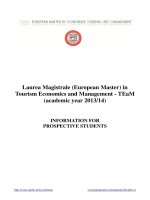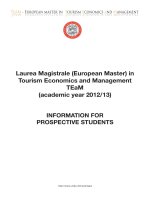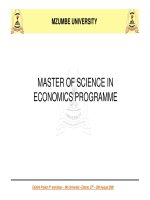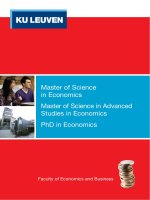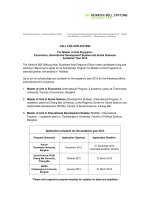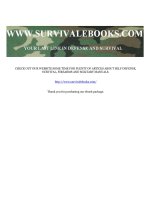For Master of Arts Programs: Economics, International Development Studies and Social Sciences Academic Year 2013 ppt
Bạn đang xem bản rút gọn của tài liệu. Xem và tải ngay bản đầy đủ của tài liệu tại đây (70.33 KB, 7 trang )
CALL FOR APPLICATION
For Master of Arts Programs:
Economics, International Development Studies and Social Sciences
Academic Year 2013
The Heinrich Böll Stiftung (hbs) Southeast Asia Regional Office invites candidates living and
working in Myanmar to apply for its Scholarship Program for Master of Arts Programs at
selected partner Universities in Thailand.
Up to six full scholarships are available for the academic year 2013 for the following fulltime
international M.A. programs:
1. Master of Arts in Economics (International Program, 2 academic years) at Thammasat
University, Faculty of Economics, Bangkok
2. Master of Arts in Social Science (Development Studies), (International Program, 2
academic years) at Chiang Mai University, at the Regional Center for Social Science and
Sustainable Development (RCSD), Faculty of Social Sciences, Chiang Mai
3. Master of Arts in International Development Studies (MAIDS), (International
Program, 1 academic year) at Chulalongkorn University, Faculty of Political Science,
Bangkok
*Please visit respective program websites for updates on dates and deadlines
Application schedule for the academic year 2013
Program/University Application Opening* Application Deadline*
M.econ
Thammasat University,
Bangkok
November 2012
21 December 2012
(extended deadline: 28 Dec)
Social Science, RCSD
Chiang Mai University,
Chiang Mai
October 2012 31 March 2013
MAIDS
Chulalongkorn University,
Bangkok
January 2013 31 March 2013
A. Preconditions to be eligible for the Scholarship Program:
1. All applicants with a bachelor’s degree in all disciplines are eligible to apply for the
scholarship (applicants for the economics program should hold a BA degree in
economics or similar and demonstrate a strong proven background in mathematics
and statistics).
2. Applicants must live and work in Myanmar and be willing and likely to return to
Myanmar after graduation.
3. Candidates must prove a very good spoken and written command of English,
according to the required TOEFL and IELTS etc. score of the respective university
and program.
4. Applicants accept to maintain student status throughout the period of the study. They
should devote themselves fulltime and with ambition to the study and abide by all
terms and conditions outlined in a Memorandum of Understanding signed by an hbs
representative and the scholarship recipient.
5. Hbs gives priority to applicants with relevant working experience and social
commitment who seek employment with local civil society organizations, the public
sector or research institutes/think-tanks in Myanmar.
6. Hbs pays particular attention to have a balanced participation of women and men in
the Scholarship Program and invites applicants from all ethnic groups.
B. Financial benefits of the scholarship
The objective of the Scholarship Program is to provide an opportunity for students to develop
their academic, intellectual and personal skills and capacities, their perspective on national,
regional and international politics as well as concepts of development and sustainability. The
Scholarship Program is designed to provide sufficient financial support to students who are
enrolled in one of the M.A programs as mentioned above. The scholarship will cover the
regular period of study as defined by the program (1 or 2 academic years respectively).
The scholarship includes:
1. Tuition & registration fees
2. Travelling costs:
2.1 Return trip from Myanmar to Thailand
2.2 Travelling costs for field trip for data collection (if necessary)
3. Fixed monthly allowance for food, accommodation etc.
(expenses exceeding allowance have to be covered by student)
4. Book and thesis allowance
5. Health insurance
C. Application procedure step by step:
1. Go to the respective website of the program you are interested in (see URL below),
study the application procedure and download application forms.
2. The official application form and all needed support documents must be submitted in
hard copy directly to the address of the University program before the application
deadline. (Please note that the final deadline might be subject to change, consult the
website of the Respective program accordingly)
It is NOT necessary to send the application documents to the office of the Heinrich
Böll Stiftung!
3. The University will only accept complete applications! Please check your documents
carefully! If you expect some documents to be available only after application deadline
please tell the University (program officer) in advance!
4. Indicate in your application form to the University that you seek a scholarship
from Heinrich Böll Stiftung.
5. For questions concerning the application process please contact the respective
University (program officer) directly.
6. Only candidates with sufficient academic qualifications and strong proven English skills
will be admitted to the University. Subsequently, only the documents of applicants who
have been admitted to the program will be forwarded to Heinrich Böll Stiftung to be
considered for a scholarship.
7. Hbs and the respective Universities will select the final candidates for the scholarship
from the short list of admitted candidates together.
8. Hbs and the respective University program may contact applicants for interviews during
the selection process in early 2013. The interviews will be held in Yangon. Applicants
have to cover the travel costs to the interview venue themselves. Invitations for the
interview will be sent out a few weeks in advance.
9. Decisions made are final. Only selected candidates will be contacted.
10. Applicants can re-apply for the Scholarship Program the following year. Applicants
already admitted to the University but not awarded a scholarship may keep this
admission for re-application for the scholarship.
11. Selected candidates may need to attend a mandatory preparation-course before the
official start of the program, if necessary.
D. Short description of M.A. programs:
1. Master of Arts in Economics International Program (two years program) at
Thammasat University
Objective of the Program
To generate economics graduates equipped with economic theory and methodology
sufficient to conduct research and study in economic fields at a high quality level.
To generate economics graduates who are capable of undertaking high-level duty such
as lecturers, with ability to encourage analytical thinking in students at the secondary and
tertiary levels, and specialists with expertise in economic analysis and planning in public
and private organizations.
Course Description:
Compulsory courses: Microeconomics, Macroeconomics, Mathematical Economics,
Statistics for Economics, Econometrics, Research Methods in Economics
Electives: Political Economics, Economic Theory, Quantitative Economics, Mathematical
Economics, Econometrics, Monetary Economics, Public Economics, International
Economics, Development Economics, Human Resource & Natural Resource Economics,
Human Resource Economics, Natural Resource & Environment Economics, Industrial
Economics, Agricultural Economics
Please note that not all elective courses are available each year.
For more information refer to:
(Click on “English” language button/”Academic programs”/”Master of Arts in English”)
2. Master of Arts in Social Science (Development Studies), RCSD, International
Program (two years program) at Chiang Mai University
Program Aims
The M.A. in Social Science (Development Studies) strives to develop a methodology that is
not strictly bound by static or essentialist modes of thinking. The body of knowledge taught;
therefore, is derived from dynamic models which are suited to social and environmental
contexts. It uses multiple methods to encourage learning from local experience, and
promotes local participation in the management and development of natural resources. The
sustainability of natural life support systems and equitability of resource use are also
explored.
We encourage our students to search for alternative policies and to strive for the promotion
of sustainable development based on ecological sustainability and security of local
livelihoods through the participation of local people. Research topics focus on, among other
things, resource management, local knowledge, sustainable development, health, cross-
border migration and gender.
Course Description:
Core Courses: Social Sciences Theories, Conceptualization in Social Research,
Development Theories, Seminar: Special Issues on Development Studies
Electives: Development Studies, Ethnicity and Development, Women’s Studies, Health
Social Sciences
For more information refer to:
3. Master of Arts in International Development Studies (MAIDS), International
Program (one year program) at Chulalongkorn University
Program Aims
The Master of Arts in International Development Studies, known for short as MAIDS, is
intended for people who are making, or have the potential to make, a meaningful
contribution as researchers, practitioners and leaders in the field of international
development. The graduate program expects applicants to be talented graduates with some
work or volunteer experience in international development, generally in the non-profit or
governmental sectors. The program particularly encourages applications from citizens and
residents of the Greater Mekong Sub-region countries.
The program is looking for individuals with sensitivity to and involvement in issues such as
the promotion of social change, human rights, local community development, media freedom
and humanitarian aid. The curriculum combines the study of rigorous theoretical frameworks
with practical field experience. Students have the opportunity to network with a wide range of
practitioners working with government, international and civil society organizations. The
thesis project allows the student to develop expertise in an area of interest.
Course Description:
Compulsory Courses: Development Theory and Practice, Globalization and Development
in Asia and the Pacific, Politics of Public Policy, Research Methodology in Development
Studies
Electives: Communication, Democratization and Development; Conflict Resolution,
Development Project Management, Human Rights and Gender Problems in Asia and the
Pacific, Migration as a Development Issue, Selected Topics in Development and Economy
Environmental Politics and Policy, Development Practicum
Please note that not all elective courses are available each year.
For more information refer to: />
E. Contacts to submit applications
Graduate Studies Program, Faculty of Economics
Thammasat University
2 Prachan Rd.,
Bangkok 10200, Thailand
Contact person: Ms. Wannah Vejbrahm
Email:
Tel: +66-2-613-2422, +66-2-613-2425
Fax: +66-2-224-9428
Website:
(Click on “English” language button/”Academic programs”/”Master of Arts in English”;
The application information on the website will be updated within the next weeks)
Master of Arts in Social Sciences (Development Studies) Program
Regional Center for Social Science and Sustainable Development (RCSD)
Faculty of Social Sciences, Chiang Mai University,
Chiang Mai 50200, Thailand
Contact person: Ms. Muttika Thungsuphuti,
Email: ,
Tel: +66-53-943595 to 6 ext. 15
Fax: +66-53-893279
Website:
Master of Arts in International Development Studies (MAIDS) Program
Faculty of Political Science, Chulalongkorn University
Henri-Dunant Road,
Bangkok 10330, Thailand
Contact person: Mr. Sorasich Swangsilp, Mr. Thananaj Siriyakul
Email: ,
Tel: +66-2-218-7313
Fax: +66-2-252-6277
Website:
F. Contact Heinrich Böll Stiftung Southeast Asia:
Contact person: Ms. Nwet Kay Khine (Yangon), Mr. Rainer Einzenberger (Bangkok)
Email:
Tel: (Yangon): 09420101070
Tel: (Bangkok):+66-2-66259-60 ext. 109
For further information see also:

